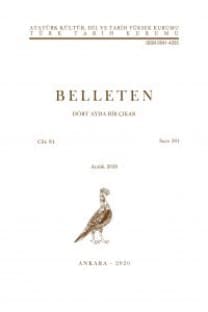Prof. Albert Gabriel'in ölümü
Kurumumuzun Şeref üyesi, İstanbul Üniversitesinin eski profesörlerinden, Fransız Arkeoloji Enstitüsü İstanbul Şubesinin eski müdürü, "Anadolu Türk Anıtları" adlı büyük eserin yazarı Albert Gabriel, 25 Aralık 1972'de, 89 yaşında, Fransa'da Bar Sur Aube şehrinde hayata gözlerini kapamıştır. Türkleri içtenlikle seven ve bu sevgisini hayatının sonuna kadar sürdüren A. Gabriel'in ölümü bizim için büyük kayıptır. Belletenin bundan sonraki bir sayısında biyografisi ve eserleri hakkında bir yazı sunacağız.
Anahtar Kelimeler:
Albert Gabriel, Türk Tarih Kurumu, Fransız Arkeoloji Enstitüsü
The Anglo-Turkish Conflict Fifty Years Ago
Fifty years ago at Chanak (Dardanelles), on Turkish territory, the Turkish Army under Mustafa Kemal (Atatürk), the national hero of the Gallipoli campaign, faced its British counterpart, commanded by General Sir Charles Harington, Commander-in-Chief, Army of Occupation. What was the British Army doing on Turkish soil, and why were the armies of these two nations poised for armed conflict? The story goes back to the First World War. The Ottoman Empire, which had participated in that War as an ally of the Central Powers (Germany, Austria-Hungary and Bulgaria), was defeated by the Entente Powers (Britain, France, Italy and Greece), and was forced to sign the Armistice of Mudros on 30th October, 1918. This Amistice some of the terms of which were deliberately made ambiguous, enabled the Allies to set about possessing the war spoils in the form of Tutkish territories which they claimed to be theirs "by virtue of the secret treaties and by right of conquest". The secret war-time agreements, contracted by the belligerent Allies on clifferent dates, had envisaged the complete dissolution of the Ottoman Empire and the division o Turkish territories amongst Britain, France, Italy and Tsarist Russia. They had also revealed the hypocrisy of the Allies, who had openly declared their war aims to be, inter alia, the preservation of the integrity and independence of the Turkish homelands.
Keywords:
Anglo-Turkish Conflict, 1922 Turkish War of Independence, The Great Offensive, Armistice of Mudanya,
- ISSN: 0041-4255
- Yayın Aralığı: Yılda 3 Sayı
- Başlangıç: 1937
- Yayıncı: Türk Tarih Kurumu
Sayıdaki Diğer Makaleler
Sultan Cem'in Portreleri Hakkında
Mudanya Bırakışmasının Ellinci Yıldönümü
Preveze Deniz Muharebesine ilişkin Gerçekler
İzmit Şehri ve Eski Eserleri Rehberi [Kitap Tanıtımı]
Ankara'nın Eski Evleri, Türk Ev Kültürü, Müze Evler
Uluslararası XXIX. Şarkiyatçılar Kongresi
